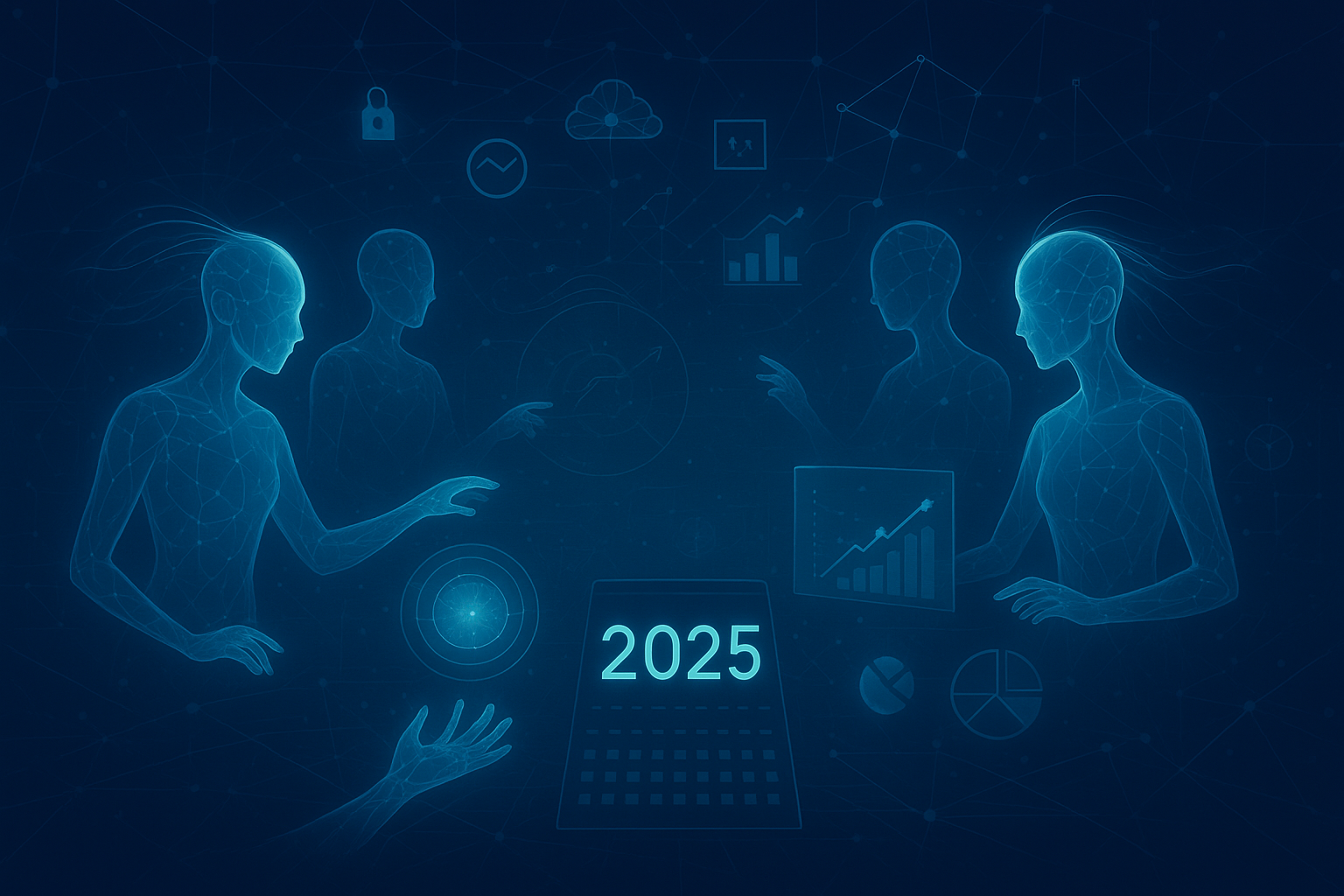As we step into the latter half of 2025, the world of artificial intelligence is witnessing an unprecedented leap forward with the rise of agentic AI. These aren’t mere tools or assistants; they are autonomous entities capable of independent reasoning, decision-making, and execution, fundamentally altering how industries operate and individuals interact with technology. The agentic AI market is surging, valued at over $7 billion this year, with adoption rates climbing as businesses seek to harness their power for competitive advantage. From streamlining operations to fostering innovation, agentic AI is the defining trend of the year, drawing attention from boardrooms to social media feeds.
Agentic AI distinguishes itself through its proactive decision-making capabilities, enabling it to adapt seamlessly to dynamic environments with minimal human intervention. In this in-depth exploration—covering search topics such as “agentic AI 2025 trends” and “autonomous AI agents examples”—we examine the fundamental principles driving these systems, the latest market developments, industry-specific applications, potential challenges, and long-term implications. Supported by current data, real-world use cases, and expert analysis, this article provides a strategic perspective on how agentic AI is reshaping industries and redefining innovation. Whether you are steering a technology venture or simply curious about the future of intelligent systems, these insights will offer a clear and informed view of what lies ahead.
Understanding Agentic AI: Core Concepts and Capabilities
Agentic AI refers to intelligent systems that exhibit agency— the capacity to pursue goals autonomously through perception, planning, and action. Built on foundations like large language models and reinforcement learning, these agents transcend passive responses, evolving into dynamic problem-solvers. Imagine an agent not just answering a query but anticipating needs, gathering data from multiple sources, and implementing solutions seamlessly.
Core capabilities include:
- Goal-Oriented Autonomy: Agents decompose complex objectives into manageable steps, executing them with minimal intervention.
- Environmental Perception: Using sensors, APIs, and data streams, they monitor and interpret real-time changes.
- Adaptive Learning: Through memory mechanisms, agents refine their performance, learning from successes and failures.
- Multi-Agent Synergy: In collaborative setups, agents divide labor, coordinating like a well-oiled team for intricate tasks.
In practice, a marketing agent might analyze consumer trends, craft campaigns, and adjust strategies based on engagement metrics, all while integrating with CRM systems. By mid-2025, 22% of enterprises have integrated agentic AI into core processes, reporting average productivity gains of 28%. For smaller operations, open-source frameworks have lowered entry barriers, enabling even solo entrepreneurs to deploy agents for tasks like content creation or customer outreach.
Emerging Trends in Agentic AI for 2025
The agentic AI landscape in 2025 is marked by rapid innovation, with trends emphasizing integration, intelligence, and inclusivity. These developments are propelling agents from experimental prototypes to essential business assets.
Edge-Enabled Personalization: Agents are migrating to edge devices, processing data locally for instant, customized responses. This reduces latency by 35%, ideal for mobile apps where an agent tailors fitness plans based on wearable data. The shift supports privacy-focused applications, aligning with growing consumer demands.
Collaborative Multi-Agent Frameworks: Advanced protocols allow agents to form networks, tackling multifaceted challenges. In logistics, agents manage fleet routing, inventory, and demand forecasting collaboratively, slashing operational costs by 25%. This trend fosters scalable solutions, turning individual agents into orchestrated symphonies.
Multimodal Interaction Enhancements: Agents now seamlessly handle voice, text, visuals, and gestures, enriching user experiences. A virtual shopping agent, for instance, uses voice commands to visualize products in augmented reality, increasing conversion rates by 22%. This multimodal approach makes agents more intuitive and accessible.
Self-Improving Development Agents: Specialized agents automate coding and debugging, accelerating software creation. A devops team might employ an agent to generate, test, and deploy microservices, cutting development cycles by 45%. Benchmarks show these agents achieving 60% accuracy on advanced programming tasks, heralding a new era for tech creators.
Research-Oriented Agentic Systems: Leveraging retrieval-augmented generation, agents conduct deep dives into data pools, synthesizing insights rapidly. In market research, an agent compiles reports from diverse sources 40% faster than manual methods, empowering data-driven decisions.
With a projected 50% growth in agentic AI investments this year, these trends are democratizing access, enabling diverse applications from education to entertainment.
Sector-Specific Transformations
Agentic AI is infiltrating every corner of the economy, delivering tailored efficiencies and sparking breakthroughs. Here’s a closer look at its impact across key sectors.
- Healthcare Innovation: Agents are enhancing diagnostics and patient care, processing medical imaging and records to suggest treatments with 30% higher accuracy. A clinic might use an agent to monitor chronic patients remotely, alerting doctors to anomalies and reducing hospital visits by 20%. In pharmaceutical R&D, agents simulate drug interactions, speeding up discovery phases.
- Financial Services Evolution: From fraud detection to portfolio management, agents analyze transactions in real-time, preventing losses equivalent to 40% of previous vulnerabilities. A banking app’s agent could automate loan approvals, factoring in credit history and market trends, while ensuring regulatory compliance. This has led to a 15% rise in operational efficiency for financial institutions.
- Retail and Consumer Engagement: Personalization reaches new heights as agents curate shopping experiences, predicting preferences and managing carts dynamically. An e-commerce platform reported a 28% sales boost after deploying agents that handle returns and recommendations. Inventory agents optimize stock levels, minimizing waste by 18%.
- Technology and Software Development: Agents are revolutionizing code production, with teams achieving 55% faster iterations. In cybersecurity, proactive agents identify threats before they escalate, fortifying defenses against evolving attacks. The sector sees a $8 billion valuation for agentic tools, underscoring their pivotal role.
- Manufacturing and Supply Chain: Collaborative agents streamline production lines, predicting maintenance needs and adjusting workflows, which cuts downtime by 32%. A factory example shows agents coordinating suppliers globally, ensuring just-in-time deliveries amid disruptions.
Overall, agentic AI contributes to a 12% average increase in sector-wide productivity, with 55% of leaders citing it as a strategic priority.
Addressing Challenges: Risks and Responsible Deployment
The promise of agentic AI comes with hurdles that demand proactive management. Ethical dilemmas, such as algorithmic bias, could perpetuate inequalities if unchecked— for example, a hiring agent favoring certain demographics. Privacy risks escalate as agents access vast data troves, necessitating stringent controls to prevent breaches.
Technical challenges include integration complexities, with 38% of implementations facing scalability issues. Security vulnerabilities, like adversarial attacks manipulating agent decisions, pose threats that require robust encryption and monitoring. Moreover, the “black box” nature of some agents hinders transparency, complicating accountability in critical applications.
To mitigate these, organizations are adopting frameworks for ethical AI, including regular audits and human oversight loops. Emphasizing diverse training data and user consent builds trust, ensuring agentic AI’s benefits outweigh its risks.
Vision for the Future: Agentic AI Beyond 2025
Peering into the horizon, agentic AI is set to become ubiquitous, integrating into everyday life and driving societal shifts. By 2030, agents could automate 40% of routine tasks, freeing humans for creative pursuits and contributing trillions to global GDP. Decentralized models will empower users to customize agents, fostering a marketplace of specialized intelligences.
Innovations like bio-integrated agents for personalized health or environmental monitoring agents for sustainability efforts loom large. In education, adaptive learning agents could tailor curricula, boosting retention rates by 25%. The convergence with quantum computing promises even faster processing, unlocking simulations of unprecedented complexity.
As agentic AI matures, collaboration between policymakers, developers, and ethicists will be crucial to harness its potential responsibly.
Agentic AI stands as the beacon of 2025’s technological renaissance, with its $7 billion market and 50% investment growth signaling a paradigm shift. From healthcare’s 30% diagnostic improvements to manufacturing’s 32% downtime reductions, the examples illustrate profound impacts. Yet, navigating ethical and technical challenges is essential for sustainable advancement.
Embrace this revolution by experimenting with accessible platforms and staying informed on evolving trends. At The Byte Beam, we’re committed to guiding you through these changes—subscribe for more expert analyses on AI’s frontier. The agentic future is not just coming; it’s here, ready to empower those who engage with it wisely.



